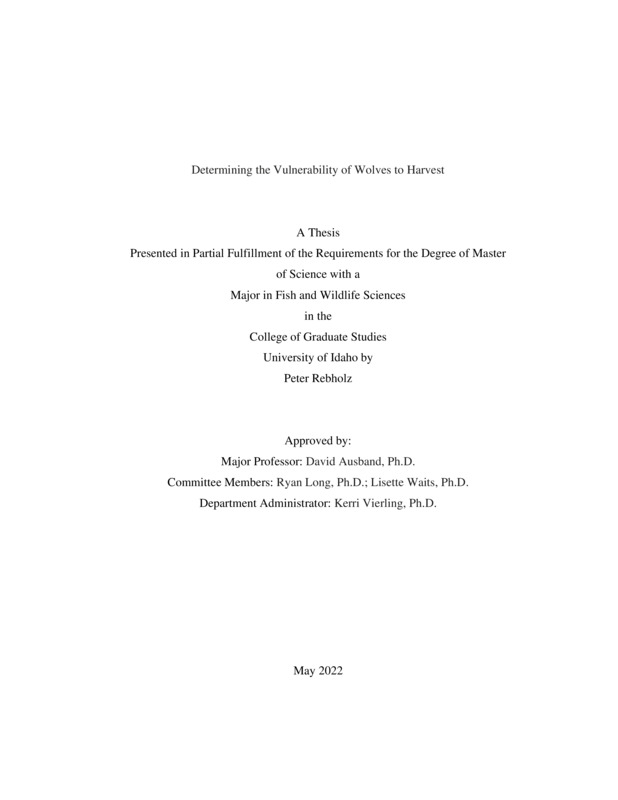Determining the Vulnerability of Wolves to Harvest
Rebholz, Peter. (2022-05). Determining the Vulnerability of Wolves to Harvest. Theses and Dissertations Collection, University of Idaho Library Digital Collections. https://www.lib.uidaho.edu/digital/etd/items/rebholz_idaho_0089n_12387.html
- Title:
- Determining the Vulnerability of Wolves to Harvest
- Author:
- Rebholz, Peter
- Date:
- 2022-05
- Keywords:
- Behavior Canis Lupus Wildlife Managment Wolves
- Program:
- Fish & Wildlife Sciences
- Subject Category:
- Wildlife conservation; Wildlife management; Ecology
- Abstract:
-
Individual behaviors are influenced by environmental, genetic, and demographic factors. Some animals choose to live in groups and cooperatively breed, and their behaviors can change depending on dynamic factors such as group size and composition that affect group persistence. Extensive research on cooperative breeding species has shown that the lethal removal of breeders from a group has direct and indirect effects on the persistence of the group. In Idaho, USA, gray wolves (Canis lupus) are harvested annually, this has provided an opportunity to investigate the effects of harvest on a population of cooperative breeders. These annual hunting and trapping seasons overlap with the dispersal and breeding periods for wolves. Currently, we know little about how many breeders, dispersing aged adults (>22 months), yearlings, and pups are harvested each year via hunting and trapping or when they are harvested each season.In the first chapter, we applied 10 years of genetic and metadata collected from harvested wolves to investigate how behaviors and ecological drivers might influence the vulnerability of wolves throughout the harvest season. We created pedigrees from non-invasive genetic scat sampling to create expected proportions of three different age classes (pup, yearling, and sexually mature or >22 months old) of wolves and compared them to the observed number of those cohorts harvested during ecologically significant periods (i.e., dispersal and breeding). We found that pups are more vulnerable to harvest in December when wolf harvest transitions largely to trapping (66%). We compared the expected and observed proportions of wolves ≥2 years old during peak dispersal season (December) and breeding season (January – February) as well as yearlings from September to October when the group moves out of rendezvous sites and found no overall trend. However, there was considerable annual variation suggesting there is more to learn about how the vulnerability of different sex and age classes of cooperative breeders varies throughout the harvest season. In the second chapter, we estimated the frequency of breeders in harvest and whether breeders were more vulnerable to harvest during the breeding season. We demonstrate a novel approach for using genetic data collected opportunistically from harvested wolves to determine if/when breeders are more vulnerable to harvest and to estimate the minimum number of breeders harvested annually in Idaho, USA, using pedigree analyses. We genotyped and aged 229 adult wolves and 203 pups using tissue and tooth samples, respectively, from wolves harvested between 2014 and 2016. We identified a minimum count of 36 breeders (n = 18 in 2014 and 18 in 2015) and found that breeders were disproportionately harvested (P = 0.08) during the breeding season (January; 25% of all breeders harvested during 2014 and 2015 harvest seasons). We estimate that a minimum of 16% of adult wolves harvested annually are breeders, or roughly 1 in 6. Our estimate of the number of breeders harvested annually is conservative because the pedigree analysis is dependent on both a pup and breeder from the same group having been harvested in the same year, and samples were excluded from the analysis if they were missing age and harvest month data or had <16 confirmed loci. Our results demonstrate that breeders are routinely harvested and that their behavior during breeding season may increase their vulnerability to harvest.
- Description:
- masters, M.S., Fish & Wildlife Sciences -- University of Idaho - College of Graduate Studies, 2022-05
- Major Professor:
- Ausband, David
- Committee:
- Waits, Lisette; Long, Ryan; Vierling, Kerri
- Defense Date:
- 2022-05
- Identifier:
- Rebholz_idaho_0089N_12387
- Type:
- Text
- Format Original:
- Format:
- application/pdf
- Rights:
- In Copyright - Educational Use Permitted. For more information, please contact University of Idaho Library Special Collections and Archives Department at libspec@uidaho.edu.
- Standardized Rights:
- http://rightsstatements.org/vocab/InC-EDU/1.0/

